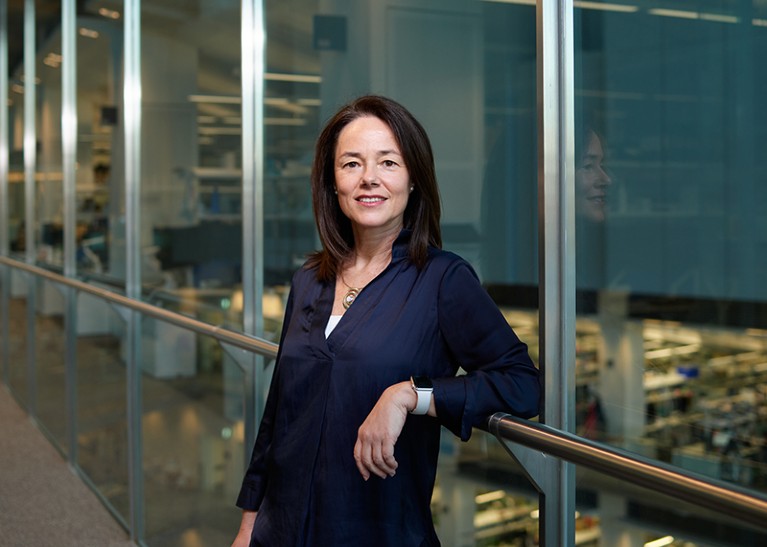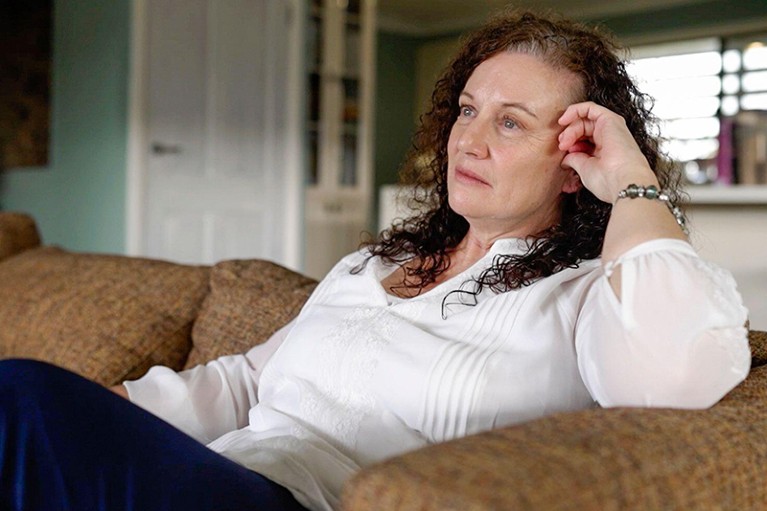
Carola Vinuesa helped to overturn the conviction of a mother jailed for killing her children.Credit: Michael Bowles/Francis Crick Institute
Carola Vinuesa’s story lies at the intersection of an unusual Venn diagram: her expertise in genetics overlaps with an interest in feminism, social justice and the sway that science can hold in a court of law.
Vinuesa’s day job is an assistant research director at the Francis Crick Institute in London, where she leads a laboratory that unpicks the biology and genetics of autoimmune diseases. She and her team have shown that there is a connection between genetic variations and autoimmune diseases such as lupus. The findings help to explain the pathogenesis of this disease, which affects 3.41 million people worldwide and includes symptoms that range from joint pain to severe organ damage.
Vinuesa also moonlights as a sort of geneticist-turned-private-investigator, lending her scientific know how pro bono to parents who she thinks are wrongly accused of killing their children (see ‘Quick fire questions’). So far, she has been contacted about six cases, and done considerable work on four. Currently, only one case has resulted in a conviction being overturned, when her intervention helped to free Kathleen Folbigg who was in prison in Australia.
“I feel so overwhelmed by the cases, each of them takes a lot more than you want to give, but these women are desperate,” she says. “I’m a mother. This could happen to me and so I feel for these women.”
This wasn’t supposed to be her career trajectory. She planned to be a physician and while studying medicine in her home country of Spain, she volunteered with a project to help train rural health-care workers in Ghana. “I finished my degree in Madrid, and I thought I would like to work for one of these organizations and perhaps be a doctor in Africa one day,” she says. Her colleagues in Ghana advised her to first go to the United Kingdom to complete her medical training because the British medical system has a reputation for thorough training, she says. “I soon found out the reality is that they were understaffed in the UK,” she says. “I found it very stressful with very little supervision and a lot of responsibility.”
In her final placement as a junior doctor, Vinuesa was working with HIV and genitourinary-medicine specialists. “I was intrigued by all these infections, and I thought I wouldn’t mind doing a PhD in immunology.” She graduated from the University of Birmingham, UK, in 2000 with a PhD, and then in 2005 went to the Australian National University in Canberra as a postdoc. “I loved research and I never looked back,” she says.
At the Crick, which she joined in 2021, Vinuesa rarely does the operational lab work anymore. “I’m more of an ideas person. I love planning. I love interpreting data. There’s a bit of stress associated with lab work, and it comes with pretty long hours,” she says. “To be completely honest, I don’t miss it.”
An unexpected opportunity
The legal component of her Venn diagram didn’t come along until 2018, when Vinuesa was working as an immunologist, still in Australia. Dave Wallace, a commercial lawyer based in Canberra who focuses on the interplay between business, finance, science and the law, called Vinuesa about Folbigg. “Carola was immediately interested in it,” he remembers.

Kathleen Folbigg spent 20 years in prison after she was wrongly convicted of murdering her children.Credit: AP/Alamy
Folbigg had been in jail since 2003, when she was sentenced to a 40-year jail term after being convicted of the murder of three of her children — Patrick, Sarah and Laura — and of the manslaughter of her first son, Caleb. Two years later the court reduced it to 30 years on appeal.
The infants had died between the ages of 19 days and 18 months. She was branded “Australia’s worst mother” by the media and convicted on the back of largely circumstantial evidence, including her diaries, which purportedly contained confessions of guilt, according to prosecutors at her trial.
They told the jury during the seven-week trial that the chance of all four children succumbing to sudden infant death syndrome was “one in a trillion” and the jury returned a guilty verdict. Wallace wondered, however, whether there was more to the story after watching a documentary on Folbigg’s case.
“I thought the case would be a good candidate for whole-genome sequencing given how far the technology had progressed,” he says. Wallace got in touch with Folbigg’s lawyers and put the idea to them. They hadn’t heard of whole-genome sequencing, but they were willing to give it a try. The technology translates a person’s entire three billion or so DNA base pairs into corresponding letters. Researchers can then trawl through the results, looking for mutations that could correspond to health problems. Folbigg’s lawyers asked Wallace to track down a scientist who would be willing to sequence Folbigg’s genome. It wasn’t an easy task.
“I contacted multiple geneticists in Sydney and Canberra, all of whom turned me down as they didn’t want to be involved in a legal matter. When I complained to a colleague about my lack of success in finding an expert, my colleague mentioned that they had recently met Carola and asked whether she would be suitable.”
Wallace says that the fact that Vinuesa was so eager to help sets her apart as a researcher and is indicative of her personality.
“Carola is a fierce scientist. Like many scientists she is inherently curious — a combination of equal parts open-mindedness and scepticism — but she is also driven by a strong sense of justice. She will back her scientific work and is not afraid to fight against overwhelming odds if she thinks science is being unfairly dismissed by those in power,” he says. “In the early stages of our involvement in the Folbigg case, Carola’s professional opinions indirectly opposed the position of the legal establishment. She suffered multiple professional attacks from lawyers as a result, but she persevered and continued to draw attention to the science until she was ultimately vindicated. She’s also very loyal to her professional colleagues and takes every opportunity to shine a light on the work of her collaborators.”
For the case, Vinuesa worked with scientists around the world — including Todor Arsov, a medical geneticist at Goce Delčev University, Štip in North Macedonia and Matt Cook, an immunogeneticist at the University of Cambridge, UK. Vinuesa set about sequencing Folbigg’s DNA, and testing blood samples that were taken from some of the deceased children. She and her colleagues found that the children’s samples had a mutation in a gene called CALM2. Researchers now think that these mutations were caused by a specific interplay between the DNA of both parents, which would explain why Folbigg is a healthy individual, but her children were not. It’s impossible to fully understand the genetic interplay, however, because Folbigg’s ex-husband has refused to submit a sample for genetic analysis. The CALM2 gene contains the instructions for making a protein called calmodulin 2. Faulty calmodulin proteins had already been linked to an irregular heartbeat and other disorders. Vinuesa suggested that flawed calmodulin proteins caused the deaths of Folbigg’s children.
Re-examining the evidence
Just finding the mutations wasn’t enough to overturn the ruling, however. Vinuesa and her colleagues — including Wallace — gathered as much data as they could from other studies and presented them in a paper1 in which they detailed that the mutation was pathogenic and that the children probably died owing to complications associated with their genetics. The Australian Academy of Science in Canberra backed the scientists’ call for Folbigg’s case to be looked at again, paving the way for her release and pardoning in 2023.
But Vinuesa didn’t stop there. A peek behind the curtain of the legal system made her think that there must other people in similar predicaments. She soon realized that she was right. Since then, other parents accused of similar crimes have approached Vinuesa and her colleagues for help.
And invariably, says Vinuesa, they’re women. There’s a simple explanation for that. Women tend to take more parental leave than do men and so they spend more time alone with their babies than men do. Statistically, that means they’re more likely to be the first on the scene if something terrible happens. As such, they’re more likely to be blamed, says Vinuesa. “It’s just appalling.” That makes her genetic detective work something of a social-justice issue.
“These cases are difficult to diagnose, but genetics can explain them. But by the time we provide the genetic information, clearly the wheels have gone off the wagon. If the child isn’t dead, the social services have usually been involved and they’ve removed the children from the family,” says Vinuesa. “The mother by then has put a number of complaints to the hospital, asked for quite a lot of second opinions. Then she’s been labelled with attention-seeking disorder because she’s asking all of these doctors’ opinions.”
Vinuesa thinks that tackling these cases is a worthy cause, but it’s not always so rewarding. Sometimes verdicts go against her scientific judgement.
Last November, she wrote an extensive report for Roula Pispirigkou, a 35-year-old woman in Greece who was accused of murdering her three daughters. The case is conspicuously similar to that of Folbigg, says Vinuesa. Pispirigkou was sent to jail with a life sentence in March this year, on the back of evidence that Vinuesa thinks is shaky and incomplete. The press coverage of Pispirigkou was also steeped in sexism, she says, with the media calling her a “modern Medea”, referencing the enchantress in Greek mythology who kills her own children in an act of revenge against her husband.
This is exactly the kind of case that frustrates Vinuesa, says Wallace. “She hates the idea that someone could be convicted of a serious crime like murder or infanticide without the legal system having first exhausted all reasonable lines of scientific inquiry. I think she also likes the challenge. Cases like that of Folbigg are often at the cutting edge of science. Where Carola and her colleagues identify a genetic cause of death or disease in such a case, it can have implications not only for the legal matter but also the wider medical community,” says Wallace.

